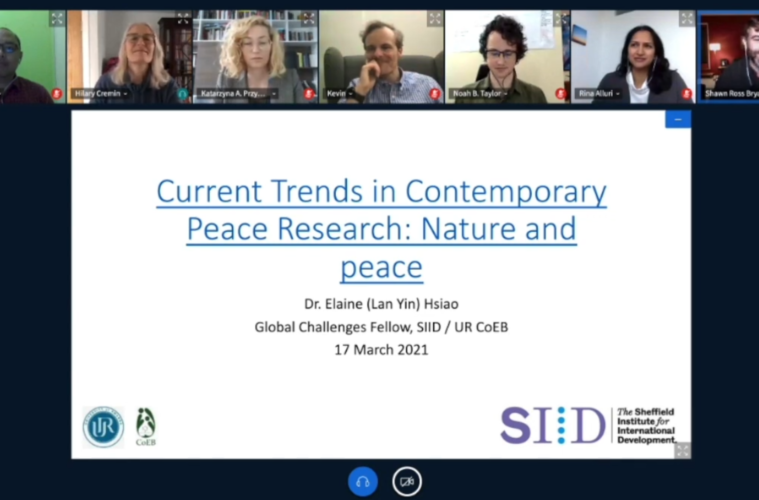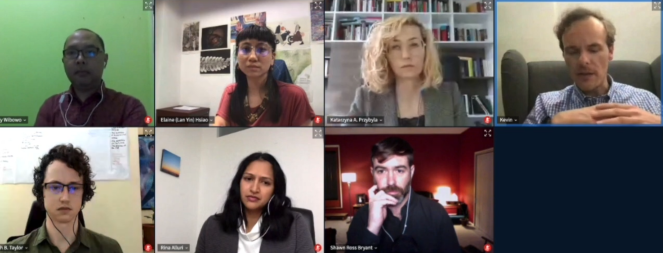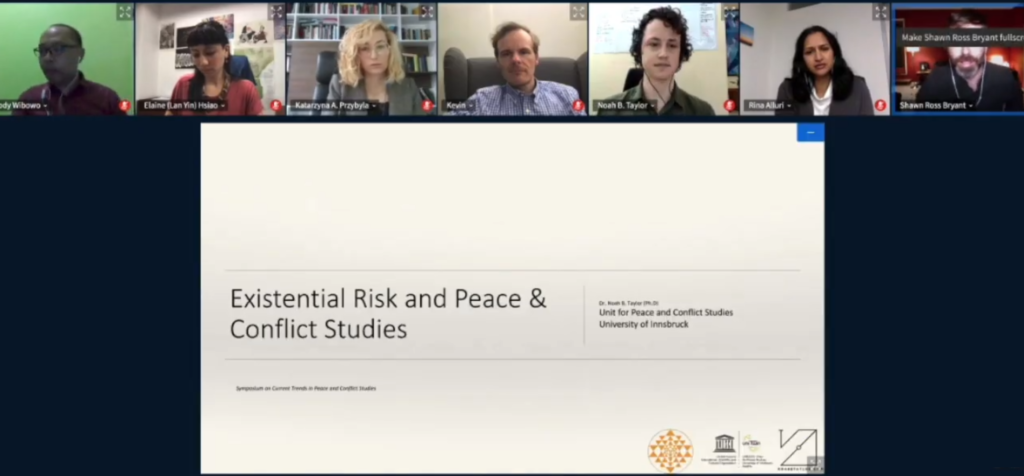Reflections on an online symposium by organizer, attendees, and peace students
On 17 March 2021, Shawn Bryant, lecturer and core faculty member of the Master program for Peace Studies at the University of Innsbruck, introduced six peace researchers to interested viewers at an online symposium about “Current Trends in Contemporary Peace Research”. In this article, Shawn Bryant comments on the symposium’s genesis before this volume’s editors present a summary of the essential points made by each panelist, and attendees of the symposium reflect on what resonated with them.
Out of a genuine curiosity about current peace research around the world, we, Stefania Kerschbaumer and Suzanne Sontag, former Peace Students and current editors with the Many Peaces Magazine, attended the online symposium on 17 March. We experienced informative and insightful presentations as well as a subsequent discussion, which in turn sparked a conversation between us that led to this article. One of the ideas that instigated our reflections was brought by Dr Hilary Cremin, senior lecturer at Cambridge University and fellow attendee: “Many socially-aware people are very good at the ‘de-‘, deconstructing, demolishing, deleting… Not so many people are prepared to engage with the ‘re-‘, repairing, reconciling, redeveloping… It is much riskier to stand up for something, to try something, to be something.”
An ensuing conversation revolving around this topic of ‘de-’ and ‘re-’ motivated us to look more closely at the conception of this symposium, the main issues that were brought by the presenters, and what continues to reverberate in some of the participants after the event. Through this process, we know that this is an ongoing conversation that does not exhaust itself here, but calls for many more questions and even more attempted answers every day – mirroring the processes of the many peaces.
The symposium’s genesis: a message from organizer Shawn Bryant
The idea to hold some kind of event on peace research stemmed from conversations we were having as a teaching faculty in Innsbruck about future research priorities. This quickly led to a much deeper discussion of what really is the current state of the art of the discipline of peace and conflict studies, given that it is transdisciplinary, multifaceted, and that the peaces are many. What are the burning topics of the moment and what will they be in the near future? From there came the idea to use our extended networks to ask other peace scholars their expert opinions from distinct perspectives. All of the panelists, in addition to being people I know, were chosen while trying to balance a few criteria: I wanted to find peace scholars with diverse research topics, who were from or working in different parts of the world, and who would bring unique perspectives on peace. I had so many people in mind, the challenge was to cut it down to a number that would be manageable in a short event. I wanted to highlight Rina Alluri, as she is a new and integral member of the Innsbruck faculty in a gesture of welcome and also as a sign of my increasing respect for her both personally and professionally, and also, imagining an audience of students of the MA program, I really wanted to introduce students to scholars outside of the core faculty who share some philosophic affinity. On a personal note, an important motivating factor was my own social engagement and professional development in a time of pandemic: I wanted to stay connected to colleagues and friends at a time when I was feeling isolated and challenged. Around a year ago I would not have imagined coordinating an online event, but the global pandemic normalized virtual meetings in a way that made it feel so easy, accessible, and effortless. The resulting process was rewarding personally, stimulating intellectually, and allowed me to feel a little bit less alone by connecting to like-minded people across space-time.
Presentations from six panelists on current trends in peace research
This online symposium engaged six Peace researchers and practitioners to present their take on current trends in peace research. The following are summaries by this article’s editors.
Rina Alluri is an Assistant Professor at the University of Innsbruck, Peace and Conflict Studies Unit. Her research interests include diaspora politics, decolonization of knowledge, gender, critical peace studies, and transrational peace philosophy.
Rina Alluri’s presentation entitled “Are good intentions enough? Reflections on decolonization and peace studies” opened up this online symposium by leading the attendees through a reflection about their peace mentors and teachers. Were they trained and/or educated in the global South? Are they part of the LGBTQ+ community or women? Are any of them BIPOC? How many are parents? The current trend Rina focused on within Peace Studies is decolonization. Pointing out some of the good intentions she sees within the field, she problematizes if good intentions are enough. She questioned whether the term decolonization can take on more qualities of the verb: It is unlearning, undoing, and a persistent process on structural, epistemic, personal, and relational levels. Daring the attendees to critically question, Rina asks us to pay attention to who we read and cite, who our role models are, and whose voices are being centered in this field. Decolonization can start with ourselves.
Watch presentation here.
Katarzyna A. Przybyla is the creator and current supervisor of the International Peace and Conflict Studies program at Collegium Civitas, Warsaw, Poland. She also serves as the Director of Analysis and the Senior Editor in the analytical center Polityka Insight.
With specific geographic focus on former Soviet Union countries as well as thematic focus on non-violence resistance, Katarzyna Przybyla presented “State’s approach to peace and the power of civil resistance.” While teaching, she has noticed the revitalization of non-violent resistance as people around the globe fight for their rights. Within her context in Poland, as well as within her area of study in former Soviet Union countries, she sees more and more of this type of resistance. Przybyla brought in research that shows non-violent resistance as being more effective than violent forms. It is more accessible and therefore allows for the quantity of participants that can then effect change. Przybyla offers an invitation to help her answer some research questions about this topic related to her area of expertise. Can civil resistance change Russia and Belarus into democracies? What is necessary for success? What is so unique about these places that makes it difficult to follow the pattern other countries have given? Why haven’t Russia and Belarus developed into democracies before?
Watch presentation here.
Kevin Kester is an educational sociologist researching and teaching educational responses to conflict, peace and development in local and global contexts. He directs the Education, Conflict and Peace Lab in the Department of Education at Seoul National University.
Kevin Kester currently researches and teaches at Seoul National University. In his presentation, he explored the intersections of “Non-linear theory in Peace Education.” He noted that often systemic and contextual analysis is missing in peace education. Kester sees a general trend towards decolonization within his research but this is caveated with instances of epistemic violence – epistemicide. With his students, Kester encourages the use of multilingual literature reviews, engagement with authors within the explored context, and learning through theories from the southern hemisphere. Another key point within Kevin Kester’s presentation was the potential of using diffraction in Peace Education to show pluralities and transformation possibilities within diverse contexts.
Watch presentation here.
Elaine Hsiao is the Global Challenges Fellow at the Sheffield Institute for International Development, an Honorary Research Fellow at the University of Rwanda Center of Excellence in Biodiversity and Natural Resource Management, and Affiliate of the Biodiversity and Security research project. Elaine Hsiao is an interdisciplinary scholar specializing in environmental peacebuilding, transboundary conservation, and indigenous/community conservation and development.
Elaine Hsiao’s presentation entitled “Nature and Peace” drew our attention to the often violent environment conservation acts, which relates to how these environments have been colonized. Environmental protection can often be seen taking a militarized approach with a focus on security. The researcher points out that environment conservation and subsequently environment research have been centered on white male voices, so there is a need within the field to redefine what environmental research is and who is carrying it out. Hsiao calls for the inclusion of indigenous perspectives to both diversify and decolonize voices in this area of study. Hsiao talked about how through lenses of critical peace, race, and feminist theories, the role of women in environmental and resource conflicts, who have previously been regarded as victims, are now viewed as agents of peace equipped with specific knowledge and relations to natural resources. Hsiao ended by questioning whether peace is only about human-to-human relations or if the more-than-human understanding of the world is as crucial.
Watch presentation here.
Dody Wibowo has worked in several institutions including UNICEF in Indonesia, the Centre for Peace and Conflict Studies in Cambodia, Peace Brigades International, Save the Children, Ananda Marga Universal Relief Team, and Universitas Godjah Mada. His doctoral research explores school teachers’ capacity in delivering peace education.
Dody Wibowo’s presentation entitled “Teachers’ professional development for peace education” centered on expanding understanding of integrating Peace Education within formal education. Wibowo’s research was located in Aceh Indonesia with several specific schools. In this research, he identified a lack of information supporting teachers in their professional development towards Peace Education. Training in elements of Peace Education was not enough for all teachers to implement Peace Education methods within the classroom context consistently. Wibowo investigated what was the difference between the teachers that did consistently implement Peace Education, and those that did not. He found that a key factor in the success of teachers’ Peace Education development was a school culture that supports a culture of peace. Wibowo identifies teachers and formal education as being specifically situated to change mindsets and support the development of understanding and kind people.
Watch presentation here.
Noah Taylor is a practitioner, researcher, and teacher of Peace and Conflict Studies and currently a lecturer in Peace and Conflict Studies at the University of Innsbruck, Austria. He focuses on a wide range of research areas including Elicitive Conflict Transformation, Transrational Peace Philosophy, Emerging Technologies, and Existential Risk.
Noah Taylor’s presentation “Peace and Existential Risk”, the latter being understood as those factors that threaten the survival and thriving of humankind, explores how to develop a research agenda between Existential Risk and Peace Studies. Work in existential risk as well as peace studies requires a transdisciplinary collaboration with long term timescales as research will be longer than any human life. Taylor identified main lines of inquiry including 1. Great Powers conflict, 2. Peace, Pandemic and Conflict, 3. Climate change, peace, and conflict, 4. Emerging Technologies whose potentials are not yet fully understood, specifically Artificial Intelligence and biotechnology. Taylor talks about the fact that the recently calculated risk of an existential catastrophe originating in an unaligned AI is 1 in 6. He further mentions the importance of both potentials of AI: a conflict escalating AI arms race as well as AI’s possibilities in peacebuilding processes.
Watch presentation here.
Reflections from attendees
The many impressions from this event were processed through conversations as well as in writing. Some attendees kindly shared their reflections with us about what has stayed with them since the online symposium.
Christina Pauls: What has stayed with me from the symposium is an urgency to dare asking uncomfortable questions about the ethics of peace studies as a discipline. Some of the questions of decolonization, the anthropocene, nonviolent resistance and artificial intelligence are pointing towards a horizon of onto-epistemic transformation. I mean: Can we still talk and think about peace within given frames of reference, or do we possibly find ourselves at a crossroads where we need new terms and concepts that help us understand these (post-)structural violences, their resistances and horizons of transformation?
Hasnaa El Jamali: The symposium was a great opportunity to discuss many interesting themes. My main takeaway is not only the importance of having an alternative narrative that people can relate to, use as a means of resistance to the dominant discourse, and a different way of telling stories, but also the need to question and decolonize our knowledge. The need to move away from security to look at increasing risks with the pandemic resulting in increased conflicts and armaments, which are very pertinent topics to look at and explore.
Julianne Lopes: The most important thing for me as a student at the University of Innsbruck was to have contact with other perspectives about the topics. At the Master’s we learn that peace is a noun in the plural and there are many ways to experience it. Hence, there are also many ways of exploring it as a peace researcher and/or peace educator. Spaces like the symposium allow me to exercise critical thinking, empathy, and curiosity. For example, I heard many times about non-violent resistance by the actions of Gandhi and other activities but it was the first time that I got in contact with the numbers and studies related to that. Knowing the academic perspective shows me how important the topic is and how it can be used to transform the still violent dynamics we are exposed to.
Rita Palinkas: Decolonization is an ongoing process that could be included into our lives from several sides and layers. The most important thing is to realize how our way of thinking is colonized and start to consciously include different lenses to it – either it is a new epistemological approach or a more minority centred behaviour in a life situation, they can all work in order to subserve long term changes.
Food for thought and further discussion
This online symposium on Current Trends in Contemporary Peace Research offers illuminating insights on some of the ties the many peaces approach has with decolonization, non-violent resistance, education, environmental conservation, and existential risk. Some questions that stay on our minds include: Whose perspective on environment conservation are we reading about? What narrative am I delving into when following a certain epistemic theory? In what way can AI be supportive in peace processes? How can schools, in their specific context, facilitate peace education? The six presentations as well as the discussion that followed raised our awareness of paths that are being walked in peace studies research, motivating us to reflect on our own standing on these very paths in order to find our personal, communal, societal and global access points to action towards sustainable peaceful change.
The Many Peaces Magazine is a platform for diverse perspectives. If you would like to engage further with this topic, send us your proposal for a contribution: magazine@manypeaces.org



